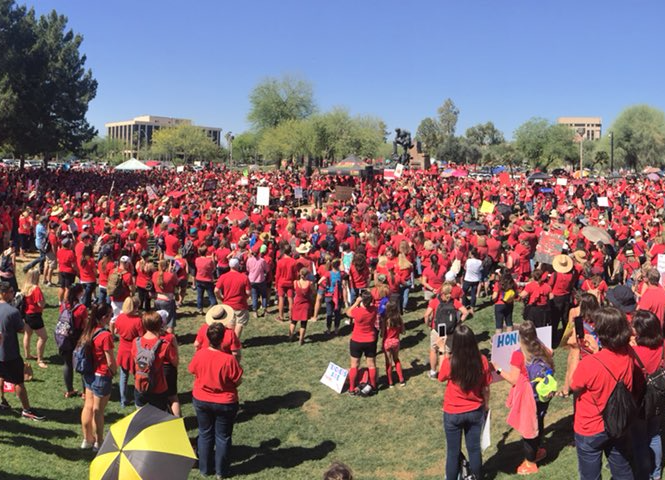Arizona legislature approves 20% pay hike for teachers

Early on Thursday morning, amid the overwhelming presence of striking teachers who had thronged the gallery, Arizona lawmakers hastened to pass a bill approving funds for a 20% pay hike for educators in the State. Funds have also been allocated to partially make up for recession-era cuts. While teachers were unhappy at some of the key demands being unmet, they are preparing for a more long-term battle in regards to allocation of funds and investment in education, including a ballot on a $700 million proposal in November. The teachers are expected to resume work on Friday.
The K-12 educational bill was debated and amendments considered for nine-and-a-half hours throughout last night, while the striking teachers, under the banner of ‘RedForEd’, waited outside the legislature, filling the Capitol courtyard with chants of ‘Red for Ed, ‘We won’t go away’ and ‘Let us in’. Finally, minutes after 5 a.m this morning, the bill was passed with a vote of 33-26. While all the Republicans in the house voted in favour of the bill, the Democrats were divided.
Most schools in Arizona had remained shut as teachers in Arizona had been on strike for a week since April 26, when an estimated 75,000 educators and their supporters gathered in the State’s capital, Phoenix. They were protesting against low wages and the reduction of funds to education by a billion dollars since the 2008 recession.
Their demands included a 20% percent pay hike, a decrease in the strength of classrooms, restoration of education funding to pre-recession levels, and an assurance that there would be no more tax cuts in the State till the per-pupil spending in Arizona reached the national average. They also demanded that “Reapportionment of tax revenue” not “hurt programs that help the low socio-economic status families and individuals”.
Education crisis in Arizona
According to data from the Nation Center Education Statistics, the annual average salary of teachers in Arizona – which is one of the lowest in U.S – is over $10,000 lower than the national average. Between 1999-2000 and 2016-17, the average salary of teachers in the State came down by 10.4%. Between 2009 and 2017, their average salaries dropped from $53,000 to $47,000.
This imposed enormous pressure on the sector. Between 2010 and 2015, teachers quit their jobs at the rate of 23% in traditional public schools and 33% in charter schools, leaving over 2,000 classrooms with no permanent instructors, according to a report in the New Yorker.
Over the last decade, per-student funding plummeted by 14%. Since 2008, the three public universities in Arizona also saw a 20% decline in enrollments for undergraduate and graduate teaching programs.
As a series of strikes by teachers rocked Republican-ruled States from last month, Arizona’s Republican governor Doug Ducey, who had earlier come under criticism for pushing tax cuts that benefited the rich at the cost of social welfare, promised to restore education funding to pre-recession levels and to provide a 20% pay hike to teachers by 2020, by implementing what he called “20 x 2020” plan.
While some teachers and school officials supported this plan, most of them rejected it on the grounds that it was not clear about details and offered nothing to the support staff, such as school-bus drivers.
What does the K-12 educational bill offer?
The bill aims at providing the money for a pay hike without any increase in taxes. This involves securing the required revenue by imposing a $24 fee for registration of new vehicles, apart from saving on the current expenditure through a dozen measures, including a bulk prescription-drugs purchasing program.
This bill, however, does not assure the required funding for every district to finance a 20% pay hike for every teacher. Stefan Shepherd of the Joint Legislative Budget Committee told House Democrats this Monday that the allocation of additional funds will be made for districts based on the national average salary of $49,000, while Nation Center Education Statistics pegs the national average for 2016-17 at $58,950. Districts will be provided 20% of the former figure, which is $9,800, multiplied by the number of teachers they report to have.
However, those districts which have an average salary higher than the national average will not receive enough funding to provide all the teachers with a 20% pay hike. On the other hand, those districts where the teachers’ wages are lower than the national average will receive funding that is higher than what is required to finance the hike.
According to the governor’s spokesperson Daniel Scarpinato, “only a few districts would not receive adequate funding, and that could be remedied in future budget years,” The Arizona Republic newspaper reported.
But this bill does not specifically make it mandatory for districts to use these funds for the salary hike of teachers.“There’s no language that says you have to give X percent pay raise,” Shepard said.
The teachers’ coalition, Arizona Educators United, and the State’s teachers’ union, Arizona Education Association, had said on Tuesday that they were not completely satisfied with this bill. However, they were willing to call off the strike and reopen the schools if the bill was passed in the legislature.
“Our fight is not over. We have options.. But it is time for us to get back to our students and get back into our classrooms,” Rebecca Garelli of AEU had said at a news conference.
The Arizona Education Association sent out a press release talking about the path ahead. “While this bill moves the needle, it still does not go far enough,” said Joe Thomas, president of Arizona Education Association. “It does not restore the more than $1 billion taken from our students and it leaves out school support staff like counselors, bus drivers, librarians, and many more who are vital to the success of our students. The truth is that this budget is far from perfect. Lawmakers brokered it behind closed doors as a partisan deal, without input from us. We were not able to change the minds of lawmakers, so the next step will be to change the faces of our lawmakers.”
Get the latest reports & analysis with people's perspective on Protests, movements & deep analytical videos, discussions of the current affairs in your Telegram app. Subscribe to NewsClick's Telegram channel & get Real-Time updates on stories, as they get published on our website.
























